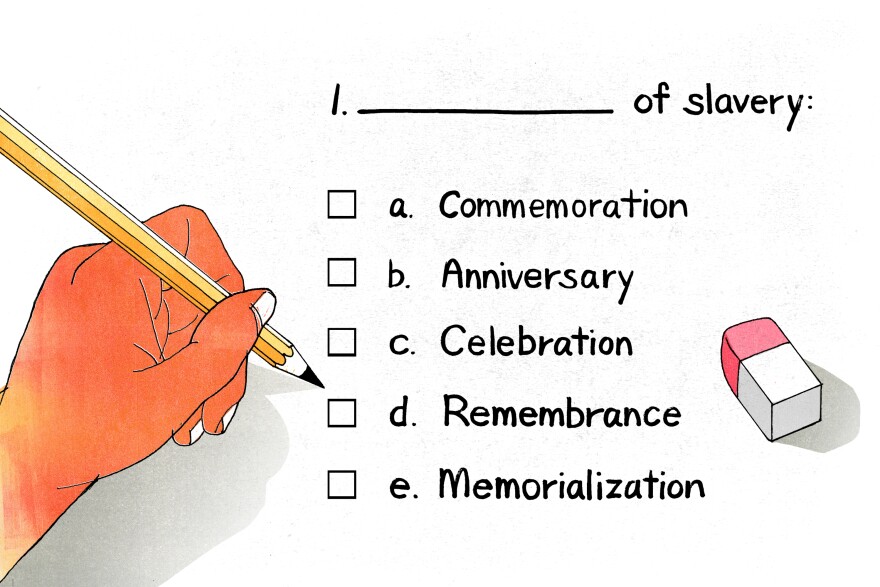There's no shortage of terrible things to think about. Our history — everyone's history — is full of them. This July marked 100 years since the start of the Red Summer of 1919, where race riots broke out in cities all over the United States. September will mark two years since Hurricane Maria devastated much of Puerto Rico. Eighteen years since the Sept. 11 attacks. Eighty years since the start of World War II.
And this month — August — since the first enslaved Africans were brought to what would become the United States. It's a moment that many are trying to reckon with right now. But what do we call it?
Some people have been using the term "commemoration." But commemorate sometimes has a positive connotation — it's often used interchangeably with "celebrate" or "honor." (We've even noticed "celebration" used on occasion.)
Robert Vinson, a professor of history and Africana studies, says he also hears the word "anniversary" thrown around a lot — "like it's a wedding anniversary. Like it's something celebratory. And I push back on that."
Vinson teaches at the College of William & Mary — a university that's a few miles down the road from Jamestown, Va., where almost 30 Angolans were first enslaved in a British colony. He has spent a lot of time thinking and talking about the legacy of that landing.
For Vinson, a word like "remembrance" is the best fit to describe how people are looking back, "because remembrance reflects a more solemn and reflective stance." He says it carves out a time and space to reflect on our ancestors and forebears in a serious way: "What must have that experience been like? What must they have suffered to make a way out of no way? How did they survive?"
Variations of "memorialization" can also be fitting, Vinson says, especially when it comes to a physical space. "When I go to places like, let's say, Thomas Jefferson's Monticello, to me that's a memorial to the enslaved," he says. "They flattened that mountain, they took those bricks up the mountain, they made those bricks, they built that house, they kept everything running."
Whatever words we choose, the practice of keeping certain histories alive — remembering — is one of the ways communities decide what is important. And doing that is no simple thing. It came up two years ago when debates were raging about what to do about Confederate monuments and what exactly they were commemorating.
During that time in 2017, Jennifer Allen, a history professor at Yale University, talked to Code Switch about the power of memory:
"Memory is not just the things that we recall on a moment-to-moment basis. Memory is something that also means something in the world. What we decide is important to remember is something that is collectively determined, and the politics, the negotiation, the conversation by which we determine what matters and what doesn't."
Copyright 2020 NPR. To see more, visit https://www.npr.org. 9(MDAxODc0NzU5MDEyMTgyMDUxMzlkN2IzMw004))



